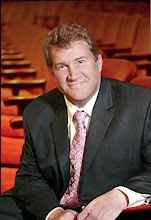 Is Spencer Barasch the man who single-handedly let alleged Ponzi schemer R. Allen Stanford (pictured left) off the hook three times, costing investors more than $7 billion? Yikes!
Is Spencer Barasch the man who single-handedly let alleged Ponzi schemer R. Allen Stanford (pictured left) off the hook three times, costing investors more than $7 billion? Yikes!Mr. Barasch gave a humous talk at Ethics Follies 2008 about business ethics right here in the River City. I guess Ethics Follies was even more in touch with current ethics issues than it even realized! Who would have guessed that a guest speaker at Ethics Follies could be responsible for a $7 Billion dollar Ponzi scheme?
The Securities and Exchange Commission's Inspector General has issued a 151-page report that says he was the former. It skewers Barasch, former head of the SEC's enforcement efforts at its Fort Worth office, as a poster child for an agency critics say missed one of the biggest investor scams of our generation. Mr. Barasch and his law firm deny his culpability.
Here's an interesting quote from the Executive Summary of the SEC Inspector General's Report of Investigation on the Allen Stanford debacle:
"Finally, the OIG investigation revealed that the former head of Enforcement in Fort Worth, who played a significant role in numerous decisions by the Fort Worth office to deny investigations of Stanford, sought to represent Stanford on three separate occasions after he left the SEC, and represented Stanford briefly in 2006 before he was informed by the SEC Ethics Office that it was improper to do so.
This former head of Enforcement in Fort Worth was responsible for: (1) in 1998, deciding to close a MUI opened regarding Stanford after the 1997 broker-dealer examination; (2) in 2002, deciding to forward the [redacted] complaint letter to the TSSB and deciding not respond to the [redacted] complaint or investigate the issues it raised; (3) in 2002, deciding not to act on the Examination staff's referral of Stanford for investigation after its investment adviser examination; (4) in 2003, participation in a decision not to investigate Stanford after receiving [Confidential Source]'s complaint letter comparing Stanford's operations to the [redacted] fraud; (5) in 2003, participating in a decision not to investigate Stanford after receiving the complaint letter from an anonymous insider alleging that Stanford was engaged in a "massive Ponzi scheme;" and (6) in 2005, informing senior Examination staff after a presentation was made on Stanford at a quarterly summit meeting that Stanford was not a matter they planned to investigate.
Yet, in June 2005, a mere two months after leaving the SEC, this former head of the Enforcement in Fort Worth e-mailed the SEC Ethics Office that he had been "approached about representing [Stanford] . . . in connection with (what appears to be) a preliminary inquiry by the Fort Worth office." He further stated, "I am not aware of any conflicts and I do not remember any matters pending on Stanford while I was at the commission."
After the SEC Ethics Office denied his request in June 2005, in September 2006, Stanford retained this former head of Enforcement in Fort Worth to assist with inquiries Stanford was receiving from regulatory authorities, including the SEC. He met with Stanford Financial Group's General Counsel in Stanford's Miami office and billed Stanford for his time. Following the meeting, he billed 6.5 hours to Stanford on October 4, 2006, for, inter alia, "review[ing] documentation received from company about SEC and NASD inquiries." On October 12, 2006, he billed Stanford 0.7 hours for a "[t]elephone conference with [Stanford Financial Group's General Counsel] regarding status of SEC and NASD matters." In late November 2006, he called his former subordinate, the Assistant Director who was working on the Stanford matter in Fort Worth, who asked him during the conversation, "[C]an you work on this?" and who in fact told him, "I'm not sure you're able to work on this." Near the time of this call, he belatedly sought permission from the SEC's Ethics Office to represent Stanford. The SEC Ethics office replied that he could not represent Stanford for the same reasons given a year earlier and he discontinued his representation.
In February 2009, immediately after the SEC sued Stanford, this same former head of Enforcement in Fort Worth contacted the SEC Ethics Office a third time about representing Stanford in connection with the SEC matter - this time to defend Stanford against the lawsuit filed by the SEC. An SEC Ethics official testified that he could not recall another occasion in which a former SEC employee contacted his office on three separate occasions trying to represent a client in the same matter. After the SEC Ethics Office informed him for a third time that he could not represent Stanford, the former head of Enforcement in Fort Worth became upset with the decision, arguing that the matter pending in 2009 "was new and was different and unrelated to the matter that had occurred before he left." When asked why he was so insistent on representing Stanford, he replied, "Every lawyer in Texas and beyond is going to get rich over this case. Okay? And I hated being on the sidelines."
The OIG investigation found that the former head of Enforcement in Fort Worth's representation of Stanford appeared to violate state bar rules that prohibit a former government employee from working on matters in which that individual participated as a government employee. Accordingly, we are referring this Report of Investigation to the Commission's Ethics Counsel for referral to the Office of Bar Counsel for the District of Columbia and the Chief Disciplinary Counsel for the State Bar of Texas, the states in which he is admitted to practice law."



